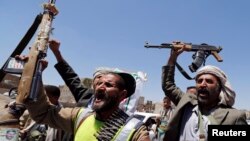Rival groups in Yemen signed a U.N.-brokered peace deal on Sunday after Shi'ite rebels seized the government headquarters and the prime minister resigned in the face of raging violence.
Yemen's Shi'ite Muslim rebels on Sunday signed an agreement with other political parties to form a more inclusive government and end days of fighting on the streets of the capital that left more than 100 people dead.
The accord calls for an immediate cease-fire, increased government transparency, and economic and security reforms.
Prime Minister Mohammed Basindwa had earlier submitted his resignation to President Abd-Rabbu Mansour Hadi to pave the way for the unity government, as rebel Houthi forces advanced on government buildings in the capital Sana'a to little resistance from the troops and security forces guarding them.
Rebels took over several sites
Sana'a residents said the Houthis had taken over several government sites including the prime minister's complex, an army command center and the state television compound after security forces withdrew - although TV broadcasts continued.
Hadi, United Nations envoy Jamal Benomar and representatives of Yemen's political forces, including the Houthi rebels, attended a signing ceremony at the presidential palace, state news agency Saba reported.
Representatives of the main political parties, including a wing of the southern separatist Herak group, the Houthis and the Islamist Islah party signed the accord.
In a speech, Hadi said: "We have reached a final deal with which we can overcome this crisis."
Benomar said the agreement calls for the formation of a government of technocrats within one month.
Under the deal, Hadi will also appoint advisers from the Shi'ite Ansarullah rebels and southern separatists within three days, Benomar said at the signing ceremony, which was broadcast on state television.
Four days of clashes
More than 100 people have been killed in four days of clashes between the northern Houthis, who have been fighting the Sana'a government on and off for a decade, and troops loyal to an army general whom they have long accused of following a militant Islamist school of thought that brands Shi'ites as heretics.
The rebels hail from the Zaidi Shi'ite community, that makes up 30 percent of Yemen's mostly Sunni nation but the majority community in the northern highlands, including the Sana'a region.
Benomar, who held talks with Houthi leader Abdulmalek al-Houthi in his home province of Saada on Wednesday and Thursday, announced late on Saturday that an agreement had been reached.
However, earlier Sunday, shelling and gunfire rocked northern Sana'a, prompting an exodus of terrified residents, a correspondent for the French news agency AFP reported.
The fighting in Sana'a has threatened a U.N.-backed transition to democracy that began when protests broke out in 2011 against veteran president Ali Abdullah Saleh, who was forced to step down after 30 years in power.
Basindwa took office in 2011 as head of a national unity government under a Gulf-brokered transition deal.
Some material for this report came from Reuters, AFP and AP.





